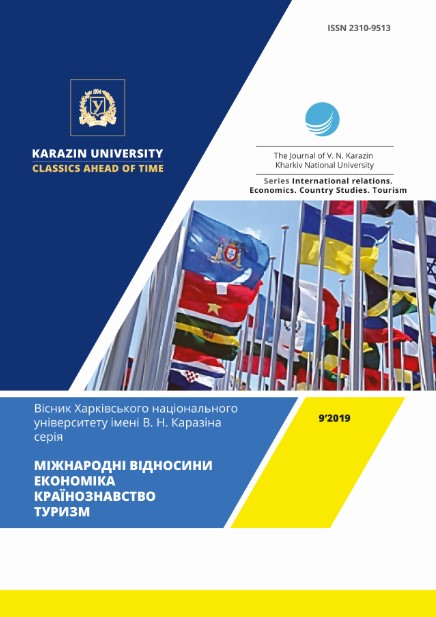Дослідження системи взаємовідносин з контрагентами як елемент оцінювання ефективності діяльності підприємства
Анотація
В умовах високого рівня нестабільності і невизначеності ринку необхідно постійно розробляти та вдосконалювати механізми для підвищення стійкості, ефективного управління підприємствами, формування нових зв’язків. Збільшення можливих варіантів взаємодії у сучасному соціально-економічному середовищі потребує розширення методологічного апарату та інструментів для вивчення взаємовідносин між контрагентами. Предметом дослідження в статті є прикладні аспекти оцінювання системи управління взаємовідносинами з контрагентами нафтогазових підприємств. Мета дослідження полягає в узагальненні теоретичних і методичних засад, розробці методичних і практичних рекомендацій щодо оцінювання системи взаємодії з контрагентами нафтогазових підприємств. Завдання: описати методичний підхід до формування системи управління взаємовідносинами з контрагентами підприємства. Використовуються загальнонаукові методи економетричного моделювання, варіації, інтегрального числення та економічного аналізу для дослідження системи взаємовідносин з контрагентами нафтогазових підприємств; системного підходу та структурно-логічного аналізу – для викладення результатів. Отримано такі результати: розроблено універсальну методику оцінки задоволеності контрагентів і системи взаємодії з ними, в якій на відміну від існуючих, в якості інструментів аналізу використано модифіковану 10-бальну шкалу Стейпла і модель «розривів», що дозволяє за результатами аналізу розривів між очікуваннями контрагентів і рівнем їх фактичної задоволеності встановити відповідність співвідношення між показниками «задоволеність», «очікування», визначити рейтинг важливості показників для споживачів та на його основі виставити індикатори акцентованої уваги підрозділів нафтогазового підприємства в загальній системі менеджменту підприємства в досягнення спільної мети – зміцнення взаємовідносин з клієнтами та відповідного збільшення прибутку за результатами господарських угод з ними. Висновки: в результаті аналізу розривів між очікуваннями контрагентів і рівнем їх фактичної задоволеності встановлено, що показники, задоволеність за якими оцінена високо, мають високий рейтинг важливості для споживачів, а також визначені показники, за якими значимість перевищує задоволеність і, отже, які потребують поліпшення.
Завантаження
Посилання
Carter, R. (1995). The Seven Cs Effective Supplier Evaluation. Purchasing and Supply Chain Management.
Kano, Noriaki, Nobuhiku, Seraku, Fumio, Takahashi, & Shinichi, Tsuji. (1984). Attractive quality and must-be quality. Journal of the Japanese Society for Quality Control, 14.
Lamben, Zh.-Zh. (1996). Strategicheskiy marketing. Evropeyskaya perspektiva. SPb.: Nauka.
Zeitaml, V.A., Berry, L.L., & Parasuraman, A. (1988). Communication and Control Processes in the Delivery of Service Quality. Journal of Marketing, 52.
Parasuraman, A., Berry, L.L., Zeitaml, V.A. (1985).Conceptual Model of Service Quality and Its Implication for Future Research. Journal of Marketing, 49.
Predvoditeleva, M.D., Balaeva, O.N. (2005). Podhodyi k upravleniyu kachestvom uslug: fokus na potrebitele. Menedzhment v Rossii i za rubezhom, 2.
Mittal, B., Lassar, W.M. (1998). Why do customers switch? The dynamics of satisfaction versus loyalty. Journal of Services Marketing, 12.
Цитування
Development of the Methodology for the Choice of Polygraphy Equipment for Printing on Cloth
Babenko Vitalina, Hrabovskyi Yevhen, Ivashura Andrii & Protasenko Olga (2020) WSEAS TRANSACTIONS ON ENVIRONMENT AND DEVELOPMENT
Crossref
Автори, які публікуються у цьому журналі, погоджуються з наступними умовами:
- Автори залишають за собою право на авторство своєї роботи та передають журналу право першої публікації цієї роботи на умовах ліцензії Creative Commons Attribution License 4.0 International (CC BY 4.0), котра дозволяє іншим особам вільно розповсюджувати опубліковану роботу з обов'язковим посиланням на авторів оригінальної роботи та першу публікацію роботи у цьому журналі.
- Автори мають право укладати самостійні додаткові угоди щодо неексклюзивного розповсюдження роботи у тому вигляді, в якому вона була опублікована цим журналом (наприклад, розміщувати роботу в електронному сховищі установи або публікувати у складі монографії), за умови збереження посилання на першу публікацію роботи у цьому журналі.
- Політика журналу дозволяє і заохочує розміщення авторами в мережі Інтернет (наприклад, у сховищах установ або на особистих веб-сайтах) рукопису роботи, як до подання цього рукопису до редакції, так і під час його редакційного опрацювання, оскільки це сприяє виникненню продуктивної наукової дискусії та позитивно позначається на оперативності та динаміці цитування опублікованої роботи (див. The Effect of Open Access).




